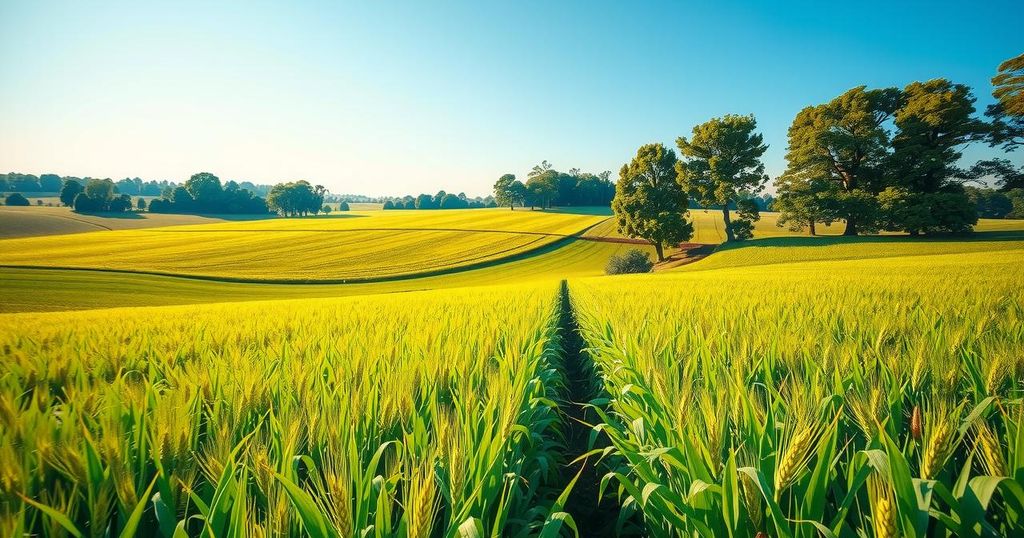Brazil’s Fertilizer Imports Experience Significant Upturn
Brazil’s fertilizer imports have surged, reflecting favorable exchange rates and strategic buying by producers, with early purchases for the 2025/26 season reaching 18%, up from 8% the previous year. Key inputs, such as monoammonium phosphate and single superphosphate, are seeing increased imports as producers capitalize on price conditions and prepare for the upcoming planting season.
Brazil is witnessing a significant increase in fertilizer imports, a situation reminiscent of the challenges faced in 2022 when Russia’s invasion of Ukraine impacted global supply chains and prices. Producers are currently capitalizing on favorable exchange rates between grains and fertilizers, leading to a notable rise in import activity.
Recent data from a Rabobank survey indicates that between November 2024 and January 2025, producers acquired 18% of their anticipated fertilizer needs for the upcoming 2025/26 crop season, marking a substantial increase from the 8% recorded during the same timeframe in the previous cycle. In January alone, fertilizer acquisitions made up 7% of the season’s projected volume, up from last year’s 5%.
Bruno Fonseca, an input analyst with Rabobank, noted, “At the end of last year, sales of potassium chloride rose sharply because prices were very attractive, and there were expectations of a slight increase.” Conversely, he mentioned that higher prices have led to reduced pre-purchases for nutrients like phosphorus, a trend expected to continue.
Consulting firm Argus reported a notable rise in imports of monoammonium phosphate (MAP), critical for soybean, corn, and wheat production. In January, Brazil imported 283,300 tonnes of MAP, nearly double the 144,100 tonnes from the same month in 2024.
Moving forward, Argus predicts that while imports will continue to rise, they will become increasingly strategic, influenced by input price attractiveness. This tactical purchasing will allow importers to adapt to exchange rate fluctuations that significantly impact foreign input procurement.
Additionally, Argus has highlighted that the expected increase in single superphosphate (SSP) imports may rise by 18% to 23% as it becomes a more cost-effective substitute for MAP in soybean production. The favorable exchange ratio for SSP compared with other fertilizers makes it appealing in the Brazilian market.
Luiz Pedro Bier, vice president of Aprosoja Mato Grosso, emphasized that producers are expediting their purchasing strategies to advantageously utilize the current exchange conditions. He remarked that while soybean prices are declining on the Chicago Board of Trade, the stronger U.S. dollar could mitigate this effect. He stated, “A strong dollar means slightly higher revenues from grain exports, but it also significantly raises input costs.”
In light of this context, producers are increasingly searching for the most favorable input purchasing conditions. Cooperatives are responding with competitive strategies to provide attractive fertilizer sales to farmers ahead of the second crop planting season. The restocking pace of input retailers will hinge on a decrease in the U.S. dollar’s exchange rate.
Experts believe that the pressure of tight margins and high phosphate costs will likely continue throughout 2025, impacting financial planning decisions throughout the agricultural supply chain.
To conclude, Brazil’s fertilizer imports are on the rise, influenced by favorable exchange rates and strategic purchasing approaches among producers. The increase in early purchases signifies a robust response to current market conditions, while essential inputs like MAP and SSP play crucial roles in supporting crop production. As producers adapt to ongoing economic factors, the focus remains on managing input costs and maximizing profitability in the agricultural sector.
Original Source: valorinternational.globo.com




Post Comment